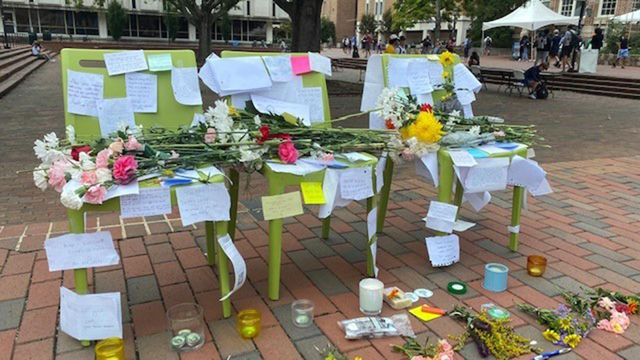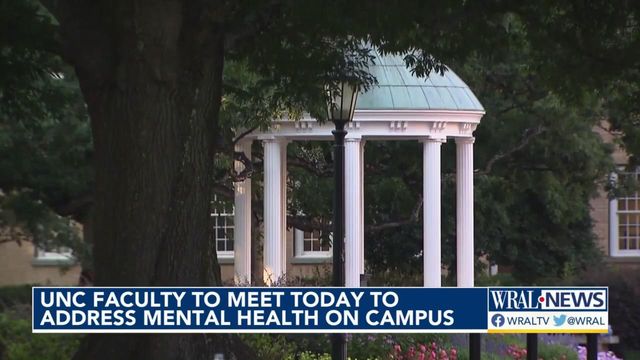Despite pressures of college, pandemic, students often reluctant to seek mental health help
Faculty at the University of North Carolina at Chapel Hill discussed mental health concerns on campus Monday, following one reported student suicide and a suicide attempt over the weekend.
Posted — UpdatedWRAL News has learned that there was a second student suicide and a second attempt at UNC-Chapel Hill in the past five weeks.
Chancellor Kevin Guskiewicz canceled all classes on Tuesday – the annual University Day celebration had already meant no afternoon classes – so students could focus on their mental health.
"Obviously, it's been a very challenging 2½ days," Guskiewicz told members of the Faculty Executive Committee. "I guarantee the majority of classes held today are very different."
Experts from Counseling and Psychological Services, the Department of Psychiatry, the School of Medicine and the School of Social Work will staff stations across the campus from 8 a.m. to 6 p.m. Tuesday, as well various hours Wednesday through Friday, to help students deal with both their own stress and anxiety and the deaths of fellow students. Students may also seek support remotely.
"There's no other way to put it other than everyone's just hurting," sophomore Sheel Patel said.
UNC-Chapel Hill students set three chairs in The Pit on campus for a daylong vigil for the students who died by suicide. Flowers were laid on the chairs, which also were covered with notes sharing students' collective sorrow and grief.
Patel said the weekend events have been a wake-up call for everyone on campus.
"There's been a sea of public outreach to the entire UNC community," he said. "I mean, everyone's saying, 'Hey, we're here for you.'"
But sometimes that's not enough, Patel noted.
"It's scary to tell your parents you're going through something," he said. "Maybe it's a sign that you want to do it on your own. I mean, you know, we're college students – we're technically adults now."
"Kids don't necessarily tell, you know. They try to shield parents from lots of information," agreed his mother, Sejal Patel.
"I think you just feel bad asking for help. You feel like a burden, right?," Raleigh psychiatrist Dr. Mona Gupta said. "So, a lot of these kids are just not asking for help or not recognizing that it could be something they could get help with."
Gupta said she recently with spoke with several UNC-Chapel Hill students and found that either they were depressed or anxious or knew others who were.
"A lot of their get-togethers are no longer parties, but they're crisis management," Gupta said. "Two of them told me that, instead of like going out and partying, like you think of college kids, they're going out and try to help someone. You know, like someone's suffering, and they go there, and they're trying to crisis-manage. And these are 18-, 19-, 20-year-olds trying to do these hard things."
Going off to college is stressful enough, she said, but the coronavirus pandemic only added to the difficulties students are facing.
"They were supposed to go to college and have the best time of their life," she said. "They ended up going into college and they – I think they just, their hopes kind of got deflated."
Gupta said UNC-Chapel Hill and other universities need to expand access to mental health services and intervention when someone needs help. Students in need of more extensive help are often referred from campus counseling to mental health professionals, she said, but those resources are so overwhelmed right now that students sometimes have to wait months for an appointment.
Counseling and Psychology Services at UNC-Chapel Hill evaluated 501 new patients, held 671 therapy sessions, helped manage medication for 570 students and assisted 45 in crisis during September, university officials said.
Parents are expected to hold a rally at The Pit between 11 a.m. and 3 p.m. Thursday to support students and raise awareness of suicide. They also plan to give out "free hugs," according to social media posts.
Faculty discussed Monday the possibility of adding other "wellness" days to the calendar this year, but Guskiewicz and Provost Robert Blouin said that would mean pushing the end of fall semester into January and delaying the end of spring semester and graduation next May.
Guskiewicz said the university will hold a mental health summit at the end of this month and has started Heels Care Network, which is designed to create awareness about mental health.
• Credits
Copyright 2024 by Capitol Broadcasting Company. All rights reserved. This material may not be published, broadcast, rewritten or redistributed.






